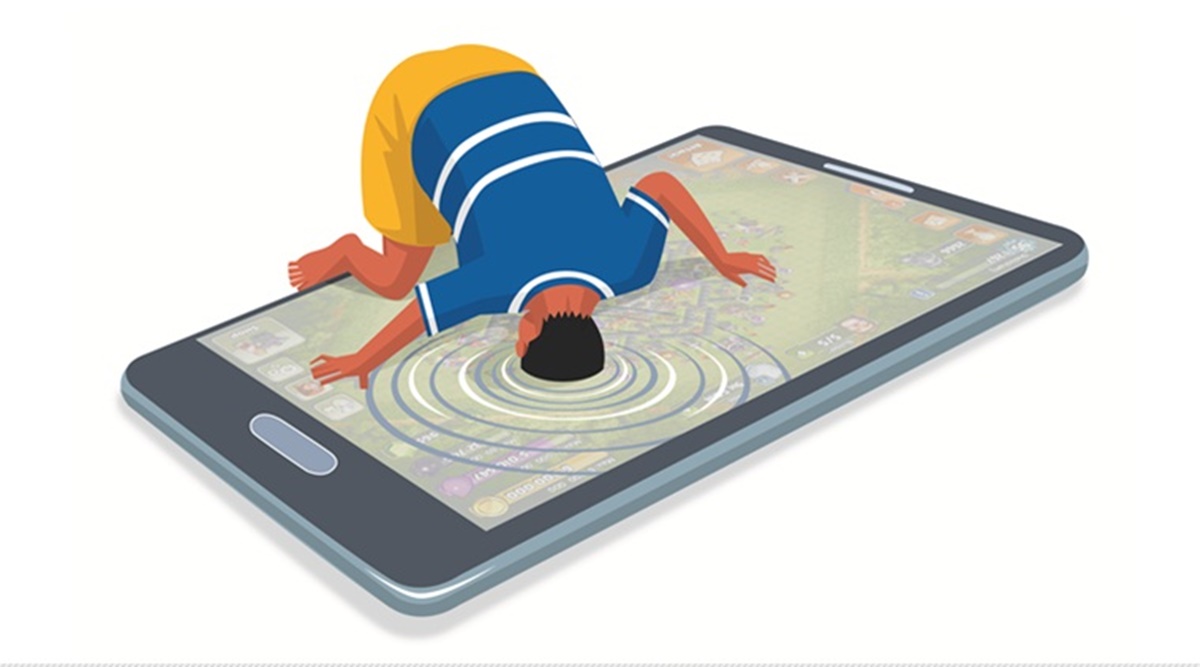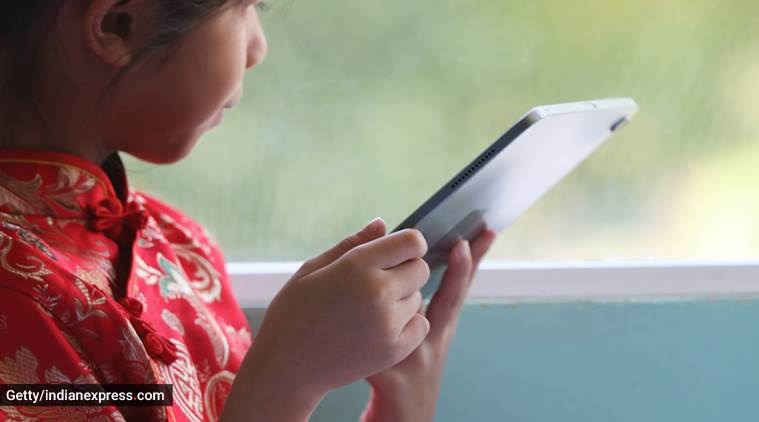
[ad_1]
 Don’t let technology rule your life; here’s how. (Source: Illustration: Subrata Dhar)
Don’t let technology rule your life; here’s how. (Source: Illustration: Subrata Dhar)
To be honest, my relationship with technology has been that of an apathetic minimalist. I have been sceptical about social media, resistant to technology and nonchalant about gadgets. Goes without saying, I have had a tough time learning and making adjustments in the last six months. The technology debate is a lot like the recent American presidential debate. You have to pick on the basis of what could be worse, make sense of things despite constant interruptions, blaming and denials, and maintain sensibility by picking significant content over all that noise.
About six months ago, as I conducted handwash and sanitisation drills with kids and staff, I was also triggered overnight to adapt and learn gadget use, research online education and conduct therapy virtually, when schools and the clinic shut. A sense of responsibility pushed me to open doors to social media, so I could reach more than one person in the hour to spread calm on mental health.
Well, whether it was my need to walk hand in hand with my kids through this period, stay better informed and help them navigate this unknown, or my purpose to contribute in the field of mental health, today I stand corrected in some of my rigid beliefs about technology, social media and gadget use.
ALSO READ | Matters of the Mind: The business of finding happiness
No doubt about cause for concern
Gaming, social media and being online work on the variable reward systems, just as with slot machines. The satisfaction elicited has been comparable to eating, sex, drugs, alcohol and gambling. A lot of these platforms have been designed to be addictive.
Attention and focus is compromised. While there is limited research that clearly attributes distractions to technology, I would like you to ask yourself how frequently you find yourself distracted with your phone to check texts or surf social media as opposed to focusing on the task at hand. If you are entirely honest you will have the answer. A simple personal example is me struggling to finish my reading on time if my phone is anywhere near me without the notifications off.
A study published in the Journal of the American Medical Association (JAMA) showed significant impact on brain development when children between ages three to five years were exposed, unsupervised, to more than an hour of screen time. Personally, I believe that under two years of age, there should be zero screen exposure.
Physical activity has been a significant concern on my mind. I believe strongly that both adults and children need to avoid a sedentary lifestyle to lead a healthy life. No, I do not hold gadgets unequivocally responsible for a lack of exercise. It is a matter of choice; however, that armed with the possibility of receiving gratification from languidly looking into a gadget, who is to be blamed if one chooses to lay on the couch and surf.
ALSO READ | Matters of the Mind: Self-discipline is a necessary tool to overcome crisis
Social media has been associated with high levels of depression, anxiety, and the fear of missing out. I also am concerned about exposure to the internet, online stalking, cyberbullying, and sexting. According to a 2018 study by The Journal of the American Medical Association, one in four teens reported having received a sext, and one in seven has sent one. Would have loved to hear Donald Trump’s argument on this one.
Research has proved that dopamine is released in response to texts, likes, and kills during gaming. When a person posts a picture and gets positive social feedback, it stimulates the brain to release dopamine, which again rewards that behaviour and enhances the social media experience. Screen use is associated with dysfunctional dopamine regulation which can negatively affect impulse control, mood fluctuations, cause withdrawal symptoms, anxiety and depression.
 It’s important to draw boundaries. (Source: Getty/Thinkstock)
It’s important to draw boundaries. (Source: Getty/Thinkstock)
Let’s admit it, we spend as much or more time with screens as our kids do. We have seen pictures online of babies during or moments after birth. Screens as digital pacifiers or babysitters when busy with managing home chores, errands and work commitments are totally unmatched. We check our phones every 10 minutes and often can’t put it away while our children are talking to us. So it’s easy to see why children think it’s okay to do the same.
Last but not the least, and probably most worrisome impact is we no longer wait to think, process, ideate, dig up our memory bank, and certainly do not try to memorise anything new. We Google to answer or create and forget it soon after because we know it will be available at the touch of a screen the next time we need it. We love the languidness most technology brings by reducing the need for effort and action.
Hold on though, I have to admit to the advantages.
It will be crude to make up our minds just yet. Technology has also brought the world closer. Information, education and commerce are just some of the areas that have seen growth and better outreach. Reaching help and support to those in need has become easier. Small businesses have better chances. Long lost families and friends have found each other.
Hate to admit it, but even playing Fortnite has been linked to enhancing eye-hand coordination, problem-solving, manipulating objects and spacial ability in some cases. Personally, I am truly grateful I am able to contribute and counsel despite my couch rendered unsafe, and it would not be possible without technology.
ALSO READ | Matters of the mind: The screen time debate
“Go back?” he thought. “No good at all! Go sideways? Impossible! Go forward? Only thing to do! On we go!” -J.R.R Tolkien
There is no better way to handle worry than to move forward with more preparation, in fact, anxiety can help us do just that. Educating our kids about the pros and cons of this digital world is imperative. As adults, we need to inform and help our children (still without a developed prefrontal cortex) process this mammoth online world that they live in.
Teach them to make sensible and safe choices, to minimise the risks and maximise the benefits of technology. Teach them that a knife can help in the kitchen but when used irresponsibly, it can hurt. Teach them that there is a difference in a real and a virtual gratifying relationship. It’s like teaching children to choose a life of hope, health, and happiness in a world that survives with a lot of worrisome triggers, for example, crime, drugs and racism. We don’t ban or buy everything, we balance with education, information and exposure. If children know about things from you, they will not ask Google.
We need to adapt and damage control asap. The sooner people like me, recover from inertia the better. Yes the online world needs taming, policies, rules and active legislation, but given government bills can’t beat the speed of the internet nor keep up with advances in technology, taking place often in a flash, we have to adapt at the micro-level, within our homes.
 Learn how to strategise screen time for kids. (Source: Getty Images/Thinkstock)
Learn how to strategise screen time for kids. (Source: Getty Images/Thinkstock)
Invest time in connecting with each other. I hate to put added pressure on parents during these times but it’s worthwhile to reconsider the multiple distractions and redefining, reviewing focus of our energies on real and worthwhile connections. Not only is this important for our loved ones but also for the sake of our own health. Setting boundaries for yourselves, knowing when to stop with the screen, acting on it and demonstrating constraint will be a great way to help our kids see that it can be done.
Helping children by offering options other than technological satiation, sharing responsibilities, indulging in conversations despite time and tone taken, may be of some value.
Technology is here to stay, and given that most of the social media platforms aim at increasing use, thereby creating addictions, we need to damage control by knowing when to stop, how, and when to replace.
It is time for us to stop worrying, develop more confidence, get creative with solutions and choices while hoping our brains rediscover joys in the real and authentic world.
(The author is a Mumbai-based psychologist and psychotherapist.)
📣 The Indian Express is now on Telegram. Click here to join our channel (@indianexpress) and stay updated with the latest headlines
For all the latest Lifestyle News, download Indian Express App.
© IE Online Media Services Pvt Ltd
[ad_2]
Source link